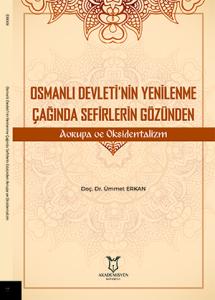Osmanlı Devleti’nin Yenilenme Çağında Sefirlerin Gözünden Avrupa ve Oksidentalizm
Synopsis
Bu çalışma, Osmanlı Devleti'nin yenilenme döneminde sefirlerin gözünden Avrupa ve oksidentalizm konusunu ele almaktadır. Avrupa'nın sömürgecilik yoluyla dünya egemenliğini elde etme çabaları, oryantalizm aracılığıyla desteklenmiştir. Oryantalizm, Doğu toplumlarını tarihsizleştirerek geri kalmışlıkla suçlamış ve Batı'nın egemenliğini meşrulaştırmıştır. Ancak Doğu toplumları, askeri yenilgiler sonrasında Batı'yı tanımaya ve anlamaya çalışmıştır. Osmanlı Devleti de Avrupa'daki yenilikleri takip etmek amacıyla sefirler göndermiştir. Bu sefirlerin kaleme aldığı sefaretnameler, oksidentalist metinlerdir ve Osmanlı modernleşmesinin bir çerçeve programı olarak da değerlendirilebilir. Bu çalışmada, 18. yüzyıldan 1872 yılına kadar yazılmış sefaretnameler incelenmiş ve Osmanlı aydın bürokrasisinin Batı hakkındaki gözlemleri ve analizleri değerlendirilmiştir.
This study examines the topic of Europe and Orientalism from the perspective of ambassadors during the period of reform in the Ottoman Empire. Europe's efforts to achieve global dominance through colonialism were supported through Orientalism. Orientalism accused Eastern societies of being backward by dehistoricizing them and legitimized Western dominance. However, Eastern societies, including the Ottoman Empire, sought to understand and learn about the West following military defeats. The Ottoman Empire also sent ambassadors to follow the innovations in Europe. The travelogues written by these ambassadors are oxsidental texts and can be considered as a framework program for the modernization of the Ottoman Empire. In this study, travelogues written from the 18th century until 1872 are examined, and the observations and analyses of the Ottoman intellectual bureaucracy regarding the West are evaluated.
Downloads

